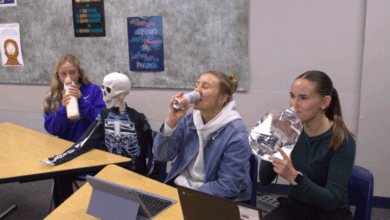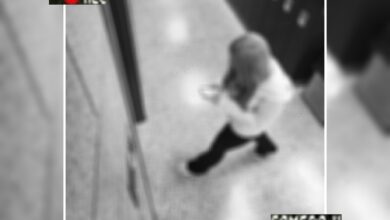Beyond BHS: Peter Sommers
The third in the series where BHS teachers share how teaching abroad impacted their lives

Author’s Note: For any student looking toward pursuing a higher education through college, phrases along the lines of “studying abroad will change your life,” are all too familiar. As someone who wants to study abroad, I try to treat these statements as true, especially after hearing personal stories from students who believe their experiences in studying abroad have changed their perspective. But what about teachers? Do they experience a similar shift in perspective after they’ve taught abroad to different students than they usually teach? I’ve decided to gather the experiences of teachers who have taught abroad in order to answer this question. For the people of BHS, here are their stories.
English Teacher Peter Sommers didn’t just teach abroad; he lived abroad. For over a decade, Sommers taught and raised a family in the Czech Republic. Living abroad for so long, he had a profound experience that changed his views of the world and how he observes his identity. Traveling to Peru for a year in college gave Sommers a travel bug. In 1993, fresh out of college, he decided to teach English at Josef Ressel Gymnasium, a high school in Chrudim, about 75 miles east of Prague. Of all the differences he initially noticed between American and Czech culture, one stood out: the use of, and relationship with, language.
“We’re a monoglot society. When you can travel 1000 miles in any direction, the assumption is you speak English,” Sommers said. “That’s not necessarily the case when you’re living in Europe or another culture where it’s polyglot. You have many languages, and it’s your responsibility to know something about those cultures and languages so that you can work with them.”
This responsibility to understand Czech culture, which is starkly different from his own, weighed on Sommers and prompted significant change.
“Going and living in another culture where the language is not yours and things are so fundamentally different tests your boundaries,” Sommers said. “You figure out who you are because you constantly have to adapt.”
Sommers tries to carry this invaluable ability to adapt with him wherever he goes. He believes it is essential for everyone to learn to be adaptable.
“I think [adaptability is] what we all have to learn no matter where we are,” Sommers said. “Especially in a world of such rapid change, you adapt or die.”
From Sommers’ perspective, language is the medium through which the Czechs adapted. With the fall of the Soviet Union just four years earlier, Russian, a language they learned under communism, became internationally unpopular. In many of the newly-independent, formerly-Soviet countries, English—the language Sommers taught—would fill the power vacuum that Russia had previously occupied.
“In the evenings, I taught former Russian teachers how to be English teachers because they were out of a job. Within a year, nobody wanted to learn Russian because they were fed up with being forced to. They saw the writing on the wall that English was kind of the de facto global language,” Sommers said. “It’s not that English is a superior language; it’s because it became the language as technology was being born in the world. [Czechs] saw it as the power seat for getting access to things.”
Not only did Czech teachers want to teach English, but Czech students were eager to learn it.
“[Students] had the drive [to learn English] because they were so hungry after 40 years of being forced to learn Russian,” Sommers said. “They expected themselves to understand my English. The kids’ attitude was very much like, ‘Oh, don’t you slow down [speaking].’ It was much more like, ‘Go, we’re ready.’”
Sommers thinks that because they had this hunger to learn, some of his students’ English is better than some Americans’ English. Furthermore, their hunger inspired him to appreciate English more.
“The other thing I’ve brought back with me is the need to appreciate and learn the language you speak,” Sommers said. “There’s an assumption that, ‘I’m an English speaker’ and ‘I’m good enough.’ If you’ve never stepped outside this culture, it might surprise you how much you might be being left behind by people who are hungrier to learn more and appreciate your language more and the power that language gives.”
Despite his appreciation of Czech culture, Sommers—although he could have conversations—never became fluent in Czech, the national language.
“It’s partly a testament to my laziness or the fact that I was expected to speak English for 80% of my day, and they didn’t expect or want me to use Czech in the classroom, even with beginners,” Sommers said. “Also, my lingua franca at home with my family was English, so ironically, linguistically my whole day I was surrounded by English more than Czech.”
Another aspect of Czech culture that Sommers noticed was different from American values was their extreme distaste for nationalistic traditions. He experienced this distaste when his students inquired about Americans participating in the Pledge of Allegiance.
“My students asked me, ‘Do they have to [say the Pledge of Allegiance]?’ and I said, ‘Well, I don’t think they have to. For some, it’s a way of expressing their love of [their] country; it’s a mantra that [one] commits to their country. And they said, ‘The Russians made us do [a pledge] as a performative thing to show our loyalty and patriotism, and none of us believed it.’”
This interaction created a moment of culture shock for Sommers and his students, both attempting to understand very different views.
“They were shocked that people would, in a free country, choose to do [the Pledge],” Sommers said. “It never occurred to me to question or see it from their perspective. Their perspective was, ‘this was something performative that the Soviets made us do because they wanted to. It was a way of censoring; because if you didn’t do it, you got in trouble.’”
Sommers lived in the Czech Republic until 1996. Then, he and his family moved to the U.S. for Sommers’ grad school; however, they knew they would move back to the Czech Republic. In 2005, they decided to return, this time to the village of Babice, just outside of Prague. Here, Sommers taught at Open Gate Boarding School, a private high school. This school was elite and, with extremely small class sizes, fostered an environment of high-quality learning.
“My biggest class wasn’t even 20,” Sommers said. “The amount of attention and individual relationship building I could give the kids was night and day compared to bigger classes.”
Beyond maintaining small class sizes, the school was extremely economically diverse, adopting a charitable practice that provided outstanding opportunities for low-income students.
“Students were all from different socioeconomic paths. What [the school] did is it went into orphanages and foster care places, and it offered them a college prep education that they wouldn’t have gotten otherwise,” Sommers said. “Then, to help fund it, they also opened it up to rich kids, so that they had tuition to fund the scholarships [for the low-income students].”
Despite having a diverse range of students financially, the school maintained equality and a tight-knit community, using uniforms to make sure no students felt different based on their financial status.
“They wore uniforms, and I never knew who was [wealthy and who was low-income],” Sommers said. “Pretty much as a social experiment, it worked. There was not this notion of bullying. We had a system that took kids who had no English when they came in sixth grade, and by junior year, they could take AP classes.”
Because so many students were provided with the opportunity to gain a high-quality education and climb the economic ladder, they took their academics seriously.
“Kids also knew, ‘we gotta try, because we’re lucky to be here. We’re on a scholarship, and other kids would love to be in my position,’” Sommers said. “There was a sense of appreciation of having this opportunity to learn.”
This sense of appreciation, whether for learning or language, is something that Sommers felt Czechs embodied during both his times living there. This is one of many values that he has taken away from his time outside the US. As someone who has spent prolonged periods of time in starkly different cultures, Sommers feels he has the exposure to uniquely different value systems. He believes this exposure can only be experienced by removing yourself from the echo chamber of one’s own country’s and culture’s beliefs.
“Travel just gives you such a wealth of learning that you can’t get sitting in your hometown in a classroom; you can’t replicate it,” Sommers said. “You learn a heck of a lot about yourself too. If you’re comfortable, you never test yourself the way you would in other cultures.”
Despite not being able to replicate the experience of travel in the classroom, Sommers attempts to present a worldly perspective on the concepts he teaches. If you’ve taken a class with Sommers, you know he encourages students to take a holistic, nuanced, worldly approach to classroom material in order to cultivate students’ personal growth. As Sommers said, “When you look at what the world is doing, there’s a whole wealth of learning that can be appreciated.”





